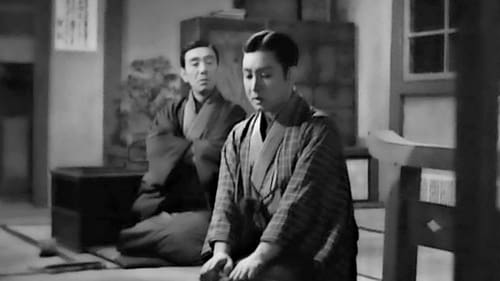
Yanosuke Maejima
A newly hired daily newspaper writer covering the society beat receives an assignment to cover Tokyo at night by walking and observing it. He gets into the right frame of mind by dressing the part as a vagrant with not a penny to his name. He gets into trouble ending up at the police station slammer overnight. He has no material to write about and, with his assignment unfulfilled, faces a cross editor.

Jidai-geki by Ryo Hagiwara

After learning that he has accidentally killed a man in a fight, Unokichi must look after the man's pregnant widow.

에도 시대, 산주산겐도 사당에서 매년 개최하는 궁술 대회는 많은 이들의 관심의 대상이다. 다이하치로의 아버지는 이 궁술 대회에서 패배한 후 스스로 목숨을 끊었고, 다이하치로는 어릴 때부터 우승을 꿈꾸며 궁술을 갈고 닦는다. 하지만 최고의 실력자 간자에몽 등 어려운 장애물이 기다리고 있다. 나루세 미키오의 첫 사극 영화.

The Way of Drama unfolds in the world of kabuki in Osaka, but also addresses the politics of popular culture and the rivalry between theatrical styles like those used by amateur actors to dramatise contemporary events.

War-time jidaigeki by Eisuke Takizawa. Didn't find anything about it online, but Takizawa was a well-regarded director in his time. Akira Kurosawa worked as A.D. on several of his films.

Set in Qingdao, China, a Japanese company locates an office there and begins work and cooperation with a local Chinese company for business. Many Japanese engineers also move to China, with their families, for the company in order to construct a canal. There are young Chinese resisting the Japanese in this area.

Sôtarô Komatsubara
This epic depicts the battle between Uesugi Kenshin and Takeda Shingen. The focus of the story is the struggle by the unit leader in charge of the main supply wagons and the supply troops to transport materiel to the Uesugi army. To this are added episodes involving an itinerant woman.

The story is based on the serial novel by Tsunoda Kikuo.

The story is based on the serial novel by Tsunoda Kikuo.

Feature film.

Jidaigeki from 1940

Wartime propaganda filmed by the Japanese in occupied China, Shirley Yamaguchi portrays an orphan rescued from the streets by a kindly Japanese merchant marine officer. Part spy thriller and part Shanghai travelogue, it was part of a popular series known as "Chinese Continental Friendship" made by the occupying Japanese in China.

This film attempts to reconstruct the tension of the Battle of Shanghai through an episode in an understated way, introducting its story in a documentary mode. In the film story, Japan's marine regiment protects Japanese residents and Chinese refugees-women and young children-from rampant street fighting, Shanhai Rikusentai unsparingly uses its first eight minutes for an official-mannered self-justification of the war. From the viewpoint of explaining Japan's military operation,the narration refers to the city s spatial division in sync with maps on screen.

Japanese film.

Pre-war jidaigeki film from 1936, produced by Uzumasa Hassei Eiga studios

Shigetao Kurahashi
Prewar jidaigeki starring Denjiro Okochi

The sequel to the 1935 film Great Bodhisattva Pass

Kinshiro takes over the family, but he thinks he is going to replace the son of his stepmother but runs into trouble when he befriends the yakuza.

A man gets rid of a cheap pot without knowing it contains a map to a treasure. As word spreads, many join in hunting it.

Japanese historical film.









